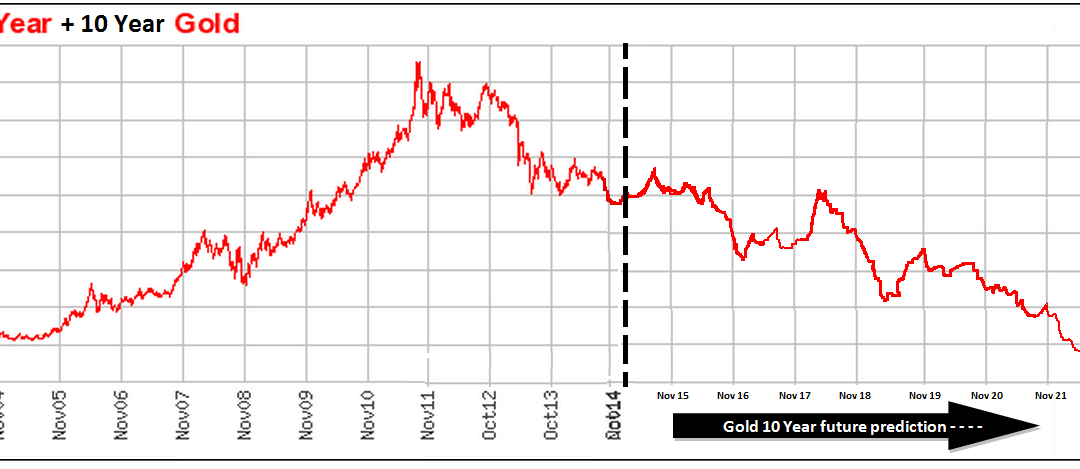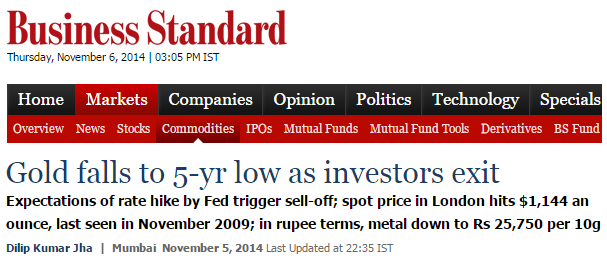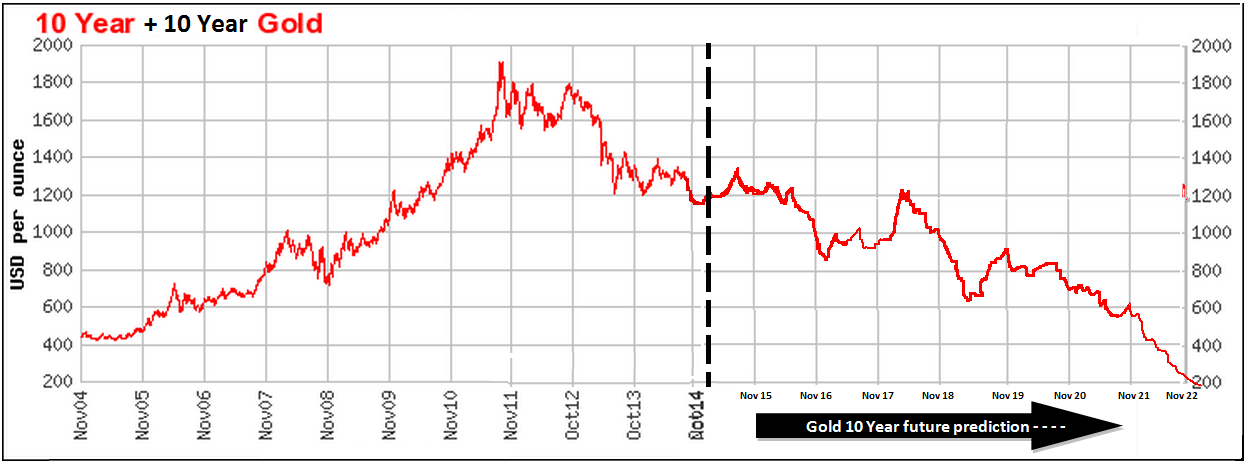In January of 2013, when the gold price was at its peak (trading in the range of ~ Rs. 32,000/ 10 gram), I had written this in my e-book – The Honest Truth:
. . . . . . “In addition to fixed income and equity investments, there is a lot of buzz about investing in gold and property. The first has some merit but the latter, in my view is unlikely to sustain its rising price in the long run. In any event, when you compare gold vs. other productive categories of investments such as equities, you will realize that equities have consistently outperformed.
What then is the reason for all this hype with the yellow metal? Was it just that people wondered where to put their savings with the equity markets (and mutual funds) performing so poorly over the recent years? Or is it something else? Will gold also see an equity market like crash?”. . . . .
You can download my e-books here.
_____________
Then 13 months back in October of 2013, I tried convincing a friend about the merits of equity investing and why he should stay away from investing in gold. After probing to some degree, I have to say that I am unsure if I was able to convince him back then. Let me reproduce the entire chat transcript from back then, verbatim (from messenger):
| Rajat: | Gold should actually have no price, it’s just a piece of expensive unproductive metal |
| Sid: | While I have the feeler that gold prices are inflated beyond a value but that is true for any equity investment as well, at least holding gold as a collateral there is value due to its scarcity, while equity value is notional |
| Rajat: | Gold is collateral? Why/ How? |
| Sid: | Because there is a value to it, always. |
| Rajat: | Why/ How? |
| Sid: | Equity is far riskier. |
| Rajat: | Why / How? |
| Sid: | Cause it is dependent far more on individuals collectively as well on regulatory environment. |
| Rajat: | Really? How is gold different? Isn’t gold a lot more dependent than equity on these 2 factors? At least 10 times more you would agree? |
| Sid: | Gold is a benchmark and if you hold it individually you hold an asset, this rides on the scarcity value of it, it’s simple demand vs. supply equation |
| Rajat: | I think my point was, why the demand for gold? Benchmark?? For what? Let me assure you, gold is neither a benchmark for anything nor does it serve as a reserve. Secondly, platinum and even mercury is more scarce than gold. At one time gold was the base currency, a purpose served by the US dollar now. In my opinion – yes it is demand and supply but the demand for gold is something I don’t understand the reason for.It’s a mad frenzy, gold prices should collapse completely . . . . I mean completely and I don’t mean 5-10% . . . . I mean completely, it’s just a matter of time. |
| Sid: | Other metals are also scarce but there is not much demand for them, since there is demand and resellers and buyers the price of gold remains high. |
| Rajat: | I agree with that! |
| Sid: | E.g. the price of real estate is also based on the resale value, people believe in buying and then selling it and then get buyers for such a high price |
| Rajat: | While I am negative on real estate too, I see an end use there. People live in houses, they are needed. What purpose does gold serve? |
| Sid: | Good point. |
| Rajat: | That’s been my point all along. Why are you buying gold? What purpose does it serve? |
| Sid: | Cause it gives me a good ROI. |
| Rajat: | The funny thing is that not only are you buying gold . . . . . you have convinced yourself that it is great buy. For some inexplicable reason! Read about the tulip bulb craze…you will like it. |
| Sid: | It is based on historical data. Gold price has always appreciated in past. |
| Rajat: | Not true. We did a 10 year study on gold here – Gold vs. Equity vs. Fixed Income |
| Sid: | . . . .and as an asset class it has been there for more than a century. |
| Rajat: | Good on you mate . . . . I’ve got to get back to work . . . . Avoid gold if you can. |
To come back to the central thrust of the above discussion:
What Does Gold Achieve to be Priced so High?

To appreciate the topic better, I highly recommend that you read the linked articles here for a more detailed discussion on – how the use of gold started and on gold becoming the reserve currency.
But habits are difficult to change. Somehow, old timers (including my parents) still believe that if all hell were to break loose, i.e. in case of a war or in case the economy or world comes to an end, the only thing that will have any value left will be gold and so it is important to stay invested in gold at all times.
This was true prior to 1971.
If a calamity hits us now, those who rely on the yellow metal as a security cushion will face ‘double whammy’ cause there will hardly be anyone looking for jewelry at such a time.
It’s just a metal!
When people work hard, they exploit the natural resources available in the world to produce goods and services which are sold for a price.
When you buy equities or fixed income products, that money is ultimately employed in business where people are paid to produce goods and services. In this scenario, you make money in the form of appreciation in share price or as interest income.
When you buy gold . . . . it sits in your cupboard, or in a locker, and does nothing. Yet you hope that a metal sitting in our cupboards will make you rich. This has been the norm for over 4 decades now.
Investing in Gold @ Rs. 25,700 / 10 gram: Will Gold Prices Appreciate Further?
Gold prices have come down by over 21% over the last ~ 2 years. From Rs. 32,000/ 10 gram to Rs. 25,300/ 10 gram. Now, it may well be that gold recovers and starts trading higher again in the near future. No one can predict the short term price movements which are determined more by the sentiment of traders as opposed to the fundamental value of an asset class. One thing is for certain, investing in gold will give you negative returns over the next 5-10 years. Below chart is a free hand sketch on how things might turn out for gold over the next decade. This is just my view, which of course puts me in a super minority particularly given the fact that the cost of getting gold out from the earth is higher than what I claim it will trade at in a decade from now (also see note at the end of this article).
How much could it correct?
Who knows!
If I had to stick my hand out and make a gamble, I would not feel over pessimistic to say that it could trade in the range of Rs. 12,000 – 18,000 in the next 5-10 years.
Note: Some have (personally) argued with me that a collapse below Rs. 22,000 / 10 gram is not possible because the very cost price of gold is higher than that, i.e. it costs on average more than Rs. 22,000 to extract per 10 gram of gold out of the earth.
2 things need to be kept in mind before you buy into any such absurd logic. First, as of November 7, 2014, the excavation cost is anywhere between Rs. 12,000 – Rs. 18,000 per 10 gram. It depends on extraction technology and more importantly upon the location of extraction. Price being cheapest in the United States and most in the Asian region. This is just an approximation based on averaging of bulk ore extraction cost to 10 gram gold.
Second and more importantly, let’s assume that I am wrong and that the extraction cost is in fact far higher.
Is that not an even more worrying fact given that the problem is one of decreasing demand?
In this case I am confused – something for which the demand is declining is soon going to sell for a price higher than its cost. Should people keep buying gold just because it costs a lot??
Have there been no industries in past that have declined because of a lack of demand and high input costs? If you believe in this ‘high cost price theory’ – Run, the crash will be far bigger than anything that you have ever witnessed before.





‘Contrarian Investment Strategies -Reloaded’ I have to say, Good thinking. I am falling in love with your articles. Good points presented in a simple way! Keep going, Rajat
Thanks Mufeed. Feel free to use the share buttons above.
This article felt very interesting then but now I regret reading this and sharing to my relatives
Why is that?
I think you have been reading my articles for years now. Have you been a client at any point?
To me it’s the best long term investment – buying gold and Silver coins online.
I always spend my half an hour to read your articles all the time along with a cup of coffee.